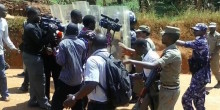Over the course of the electoral period, Ugandan police and security forces have targeted scores of journalists by restricting access to information, damaging and confiscating equipment, and have subjected them to intimidation, physical attacks and arbitrary arrests. These incidents occurred before, during and after the 18 February 2016 national election– a period of heightened political tension in Uganda.
“Freedom of expression is one of the cornerstones of a vibrant democracy, and we urge the Ugandan government to respect the right of journalists to report on political developments of public interest,” said Hassan Shire, Executive Director of DefendDefenders (East and Horn of Africa Human Rights Defenders Project). “We are concerned by the sharp increase in attacks against journalists during the 2016 election period, and call upon the Ugandan authorities to investigate these incidents and to respect the rights to information and to freedom of expression of its people.”
Our local partner, the Human Rights Network for Journalists – Uganda (HRNJ-U), has documented documented over 85 violations against journalists during the election period, beginning as early as July 2015. Since then, HRNJ-U has reported over 24 journalists having been assaulted, 3 have been shot, and at least 25 arrested. These violations were primarily connected to their hosting and covering of the activities of opposition candidates.
Between 27 February and 1 March, 13 journalists were arrested while covering the house arrest of opposition candidate Kizza Besigye and detained for several hours. Arrested journalists were accused of trespassing and inciting violence although they were not presented with any arrest warrant and no official charges were brought against them.
Elections in the East and Horn of Africa have repeatedly resulted in heavy restrictions on the operating environment of the media and civil society, as has been extensively documented by DefendDefenders. Journalists face particularly high risks when covering political and civic issues, the campaigns of opposition candidates, or topics perceived as biased or as portraying the ruling party in a negative light.
Uganda’s human rights record over the last four years will be reviewed by the Universal Periodic Review mechanism of the United Nations Human Rights Council in November 2016. In its 2011 review, Uganda accepted to investigate and hold accountable police and security officers who attacked human rights defenders, including journalists, during the 2011 post-election period. However impunity prevails, and the perpetrators have not been held accountable.
DefendDefenders calls upon the Ugandan government to:
- Immediately put an end to the practice of arbitrary arrests and detention of journalists and guarantee swift, transparent and independent investigations.
- Ensure prompt and impartial investigations into the physical attacks on journalists and damage to their equipment, and ensure the victims of these violations have access to legal remedy.
- Respect the right to freedom of expression as guaranteed by the 1995 Constitution of Uganda, and its obligations under the African Charter on Human and Peoples’ Rights, the Universal Declaration of Human Rights and the International Covenant on Civil and Political Rights.
For further information, please contact:
Hassan Shire, Executive Director, East and Horn of Africa Human Rights Defenders Project on: [email protected] or +256 772 753 753 (English and Somali)
Clementine de Montjoye, Advocacy & Research Officer, East and Horn of Africa Human Rights Defenders Project on: [email protected] or +256 752 183 305/ +33 6 58 56 26 50 (English and French)

